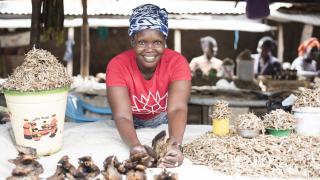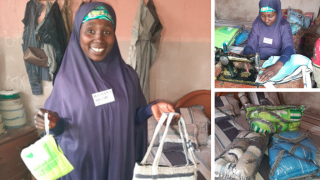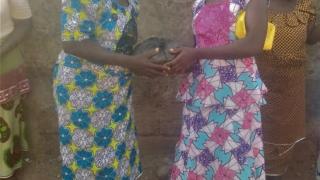After two decades of progress and backlash, what’s next for the Women, Peace and Security Agenda?
THREE RECOMMENDATIONS FOR ACCELERATING PROGRESS AMID COVID-19, ACCORDING TO WOMEN LEADERS, ACTIVISTS AND CHANGEMAKERS.
Twenty years ago, the United Nations Security Council adopted Resolution 1325 (UNSCR 1325), recognising for first time the different, disproportionate impact of conflict on women, as well as their critical role in promoting and achieving international peace and security.
To mark this landmark anniversary, Women for Women International partnered with the United Nations 75th anniversary team and the Group of Women Leaders to host an all-women virtual panel discussion on Women, Peace and Security - Two Decades of Progress and Backlash. The event brought together an incredible line-up of women working to promote women’s participation, protection and rights in conflict-affected settings around the world:
- H.E. Ameerah Haq, former UN Under-Secretary-General for the Department of Field Support and member, Group of Women Leaders
- Ambassador Melanne Verveer, Special Representative on Gender Issues for the OSCE and member, Group of Women Leaders
- Renata Giannini, Senior Researcher and international security specialist, Igarapé Institute
- Mallika Iyer, Programme Officer, Global Network of Women Peacebuilders
- Dr Abiola Akiyode-Afolabi, lawyer and civil rights activist, Executive Director Women Advocates Research and Documentation Center (WARDC)
- Natalie Samarasinghe, UN75 Deputy and Chief of Strategy
- Stephanie Siddall, Senior Global Policy and Advocacy Advisor, Women for Women International (moderator)
The discussion focussed on how we can preserve the progress made over the past twenty years and address ongoing challenges in implementing the Women, Peace and Security agenda (WPS). Critically, given the current global context of COVID-19, we asked: what needs to be done to address the gendered impacts of the pandemic and apply the mandate of UNSCR 1325 to build a more resilient future?
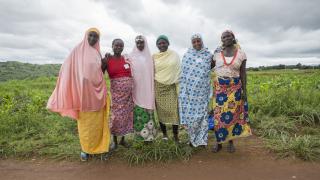
Change won’t succeed unless those in positions of power and influence practice what they preach.
1. Political will, international co-operation and concrete action: those in power must step up and practice what they preach
According to H.E. Ameerah Haq, one of the key achievements of Security Resolution 1325 has been to put a robust normative framework in place for including gender perspectives in peacebuilding and conflict prevention. Ambassador Melanne Verveer agreed, stating plainly that “we don’t need any more resolutions to 1325 to make it even stronger; we need to focus on fully implementing what it represents”.
Dr Akiyode-Afolabi emphasised its function in holding those in power to account, pointing out that civil societies in many African countries have embraced the adoption of National Action Plans as a way of ensuring that political actors respond to gender issues. Yet, despite this growing momentum, implementation has been slow and patchy. Ms Haq stressed that “change won’t succeed unless those in positions of power and influence practice what they preach” – they need to focus on concrete action, not simply checking boxes.
One key barrier, she pointed out, is that the WPS agenda is still seen as a “women’s issue” by many in leadership positions – it is put in a box, under-resourced, and not given a place at the highest levels of political decision-making. The international community needs to step up, put their money where their mouth is, and live up to their commitments.
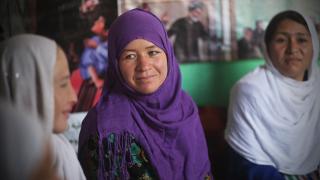
Women’s rights organisations breathed life into the UN Security Council resolutions and translated them into necessary actions on ground.
2. Prioritise women’s meaningful participation as co-decisionmakers and leaders
In her powerful opening remarks, Natalie Samarasinghe stated that “women and girls are at sharp end of the trends shaping our world – such as the climate crisis and COVID-19 – but they are also at the vanguard of solutions. They know what works best for them and their communities.”
Ms Haq emphasised that one of the key achievements of UNSCR 1325 has been giving a voice to women in Security Council briefings. A recent example is the 30th October statement by Afghan activist Zarqa Yaftali, urging members not to use women as bargaining chips in the ongoing discussions between Taliban and the Government of Afghanistan. The international community needs to hear more of these voices and first-hand experiences.
Renata Giannini warned of the risks of failing to engage meaningfully with women, pointing out that National Action Plans often do not reflect the diverse realities of Latin American women, many of whom live in situations of undeclared armed conflicts – from organised crime, to illegal mining and land conflict. They remain outside the WPS agenda. The best way of doing this is to ask women themselves - and listen to them.
Mallika Iyer reminded us that women peacebuilders were championing the Women, Peace and Security agenda long before the UN Security Council adopted it on paper. “Women’s rights organisations breathed life into the resolutions and translated them into necessary actions on ground.”
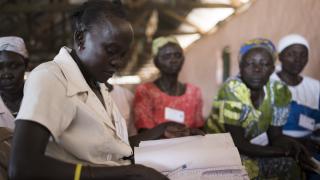
People don’t want to go back to 'normal', because normal is not working for the majority of people.
3. Crisis offers an opportunity - if we learn from it
For all our speakers, COVID-19 represents a potential tipping point. A clear message has emerged from the UN75 global consultations conducted across the world this year, said Natalie Samarasinghe: “People don’t want to go back to normal, because normal is not working for the majority of people.”
The panellists all reflected on how the pandemic had hit women hardest, particularly those in conflict and crisis situations, due to pre-existing structural barriers. From the burden of childcare, loss of earnings and lack of social protection in the informal economy, to exclusion from decision-making spaces and gender-based violence - these are all deep-rooted issues we were already struggling with as a global society.
Dr Akiyode-Afolabi shared insights from Nigeria, where she explained that women’s organisations are playing critical leadership roles in pandemic response, yet they are not being properly prioritised, resourced, or included in decision-making. In particular, she flagged how women’s organisations working on gender-based violence response and protection, are not seen as essential services and are being stripped of funding.
Ms Iyer stressed that COVID-19 has underscored the importance of bridging gaps between different international frameworks, such as Women, Peace and Security and Humanitarian Action agendas, in order to effectively address the needs of women in conflict situations. Moderator Stephanie Siddall reminded us that “women’s lives are not dictated by a superficial compartmentalisation of sectors and agendas and frameworks – bringing these together will improve realities for women and girls” – something that is at the heart of Women for Women International’s approach and advocacy.
Natalie Samarasinghe found cause for hope in the responses of 1.2m people around the world who took part in the UN75 global conversations this year: “COVID-19 has shown that transformation is possible when political will is aligned with public support.” Now, we need to harness this formula to address the needs of women and girls in conflict settings – who are most often unseen and unheard.
There was strong consensus from all panellists that women’s expertise, resilience and leadership is more essential than ever, both in the response and recovery from COVID-19, and in accelerating implementation of the WPS Agenda. Ms Iyer reflected that the “shining achievement of the Women, Peace and Security agenda is that it has brought new approaches to advocacy for gender equality, which dispel the narratives of women as victims.”
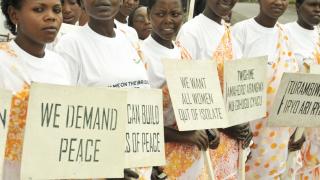
COVID-19 has shown that transformation is possible when political will is aligned with public support.
With a renewed commitment from those in power to truly listen to women; to involve them as co-decisionmakers and influencers; and to back this up with resources, support, and bold, coordinated action - 2020 might still be a year we look back on in a positive light, as a turning point for women’s rights in conflict settings.
This event was part of the UN’s global consultation, launched in January 2020, to mark its 75th anniversary – an unprecedented effort to understand the world’s hopes and fears for the future, and the role of the UN. To date, 1.2million people around the world have taken part. The recommendations emerging from this discussion will feed into the UN75 report.
Continue reading
Women Pave the Path to Peace in South Sudan
subtitle: As South Sudan marks Peace Agreement Day this year, it stands on the brink of another deadly crisis. But women hold the key to a brighter future.
As South Sudan marks Peace Agreement Day this year, it stands on the brink of another deadly crisis – but women hold the key to a brighter future.
Hassana's Story
subtitle:
When Boko Haram attacked their village in northern Nigeria, Hassana and her family were forced to flee. With support of UK aid from the UK government, she enrolled on our programme last November.
On World Kindness Day, a group of women in our programme in Nigeria show us how compassion can make the world a healthier, happier place.

